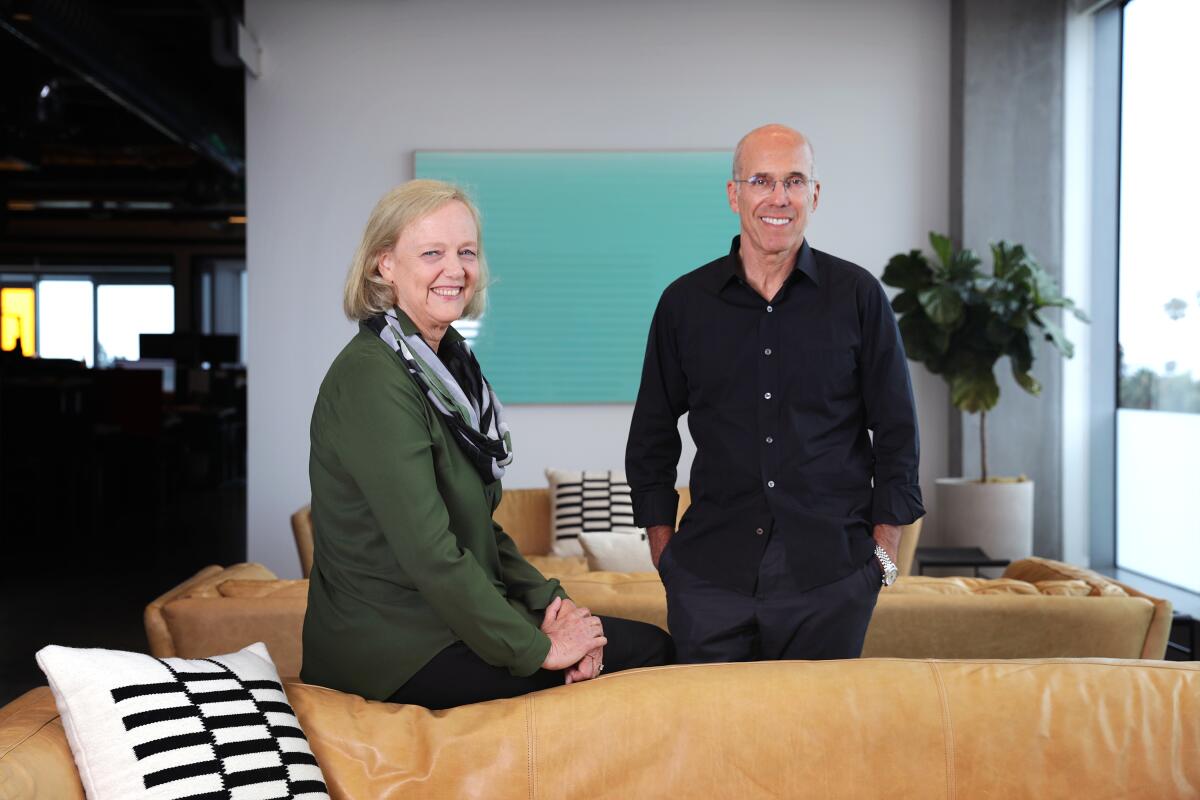Quibi denies stealing mobile technology as streaming debut looms

- Share via
SAN FRANCISCO — Just weeks before launching its streaming service, Quibi on Monday denied allegations that it stole technology from New York-based interactive video firm Eko.
Eko, which creates interactive videos in which audience members can direct plot lines and characters through their choices, has accused Hollywood-based Quibi of infringing on a patented technology that allows users to turn their phones vertically or horizontally to gain a different viewpoint when watching videos.
“Eko will take the legal actions necessary to defend its intellectual property and looks forward to demonstrating its patent rights to the court,” the company said in a statement Monday.
But in documents filed in federal court on Monday, Quibi denied the claims and sought a court order to establish that it did not lift Eko’s technology.
Eko’s “claims have absolutely no merit and we will vigorously defend ourselves against them in court,” the company said in statement.
The legal dispute comes at a delicate time for Quibi, which has much riding on the debut of its anticipated subscription service that will stream bite-sized news and entertainment — stories told in episodes of 10 minutes or less — for mobile phones.
Eko’s attorney, Neel Chatterjee, said in a January letter to Quibi that Eko “was stunned with what it saw” at Quibi’s CES keynote that spotlighted its “turnstyle” mobile technology. The letter was filed as evidence by Quibi in L.A. federal court.
“The turnstyle technology, which was the centerpiece of the entire presentation, was the precise proprietary technology that Eko had shared with Quibi executives several months ago and with Quibi engineers who had access to Eko’s source code and proprietary information subject to an NDA when they worked for a prior employer,” Chatterjee wrote in a Jan. 28 letter to Quibi.
Eko said its CEO, Yoni Bloch, discussed its service with Quibi Chairman Jeffrey Katzenberg in late March 2017 in an effort to gain more funding for Eko. In that discussion, Eko said it offered to give Quibi majority control of Eko and demonstrated its technology, but Katzenberg decided not to invest.
Eko also said it shared information about its technology with Snap, the Santa-Monica-based social media and camera company in 2017 and 2018 to potentially integrate Eko’s technology in the Snapchat app. Two of the three employees who saw a demo of Eko’s technology later joined Quibi in October 2018 and were involved in the creation of the Quibi’s similar feature, Eko alleges. The third employee joined Quibi last year. In the Snap demo, there were nondisclosure agreements in place, Eko said.
Quibi, which was founded in 2018, said that no trade secrets were revealed at the 2017 Katzenberg meeting with Eko and that no NDAs were signed at that meeting. The company also said no former Snap employees brought Eko trade secrets to Quibi and that its turnstyle technology is different from Eko’s patent.
“Quibi’s app was developed independently by Quibi’s engineers without reference to or use of any trade secret of Eko,” the company said in legal documents. “Quibi’s app is the product of many months of effort in designing, engineering, testing and refining the app.”
Quibi is asking the court to rule that it has not infringed on the patent and to stop Eko from hurting Quibi’s brand or interfering with its launch.
“Unfortunately, with the advertised launch of a high-profile new service, Quibi has already been targeted by a company looking to make a name for itself and to capitalize on Quibi’s early acclaim by making demonstrably false claims of intellectual property infringement,” the company said in legal documents filed in federal court Monday.
Eko‘s Bloch declined to comment.
In its statement, the company said “Quibi’s declaratory judgment motion is nothing more than a PR stunt.”
Eko has also notified Apple over its concerns about Quibi’s app infringing on its patent. It is unclear if this will affect when Quibi’s app will appear in the App Store. An Apple spokesman declined to comment.
On its App Store review guidelines, Apple said app developers should only use content that they have created or have a license to include.
By bringing up the issue in court, Quibi is sending a message that it is not worried about Eko’s accusation and is moving ahead with its April launch, said Jonathan Steinsapir, a partner at Kinsella Weitzman Iser Kump & Aldisert in Santa Monica.
“It shows a level of confidence,” said Steinsapir, adding that a court ruling might take at least a year.
Quibi plans to launch its service on April 6 with 50 titles. In its first year, Quibi will have 175 original shows and 8,500 episodes.
On Monday, the company said it is canceling its April 5 red carpet event in Culver City “out of an abundance of caution as we continue to monitor COVID-19.”
The company has already raised $1.75 billion and is led by CEO Meg Whitman and chairman Katzenberg.
The service will cost $4.99 a month with ads and $7.99 a month without ads.
More to Read
Inside the business of entertainment
The Wide Shot brings you news, analysis and insights on everything from streaming wars to production — and what it all means for the future.
You may occasionally receive promotional content from the Los Angeles Times.











